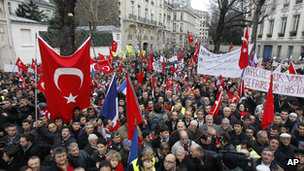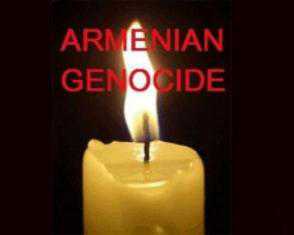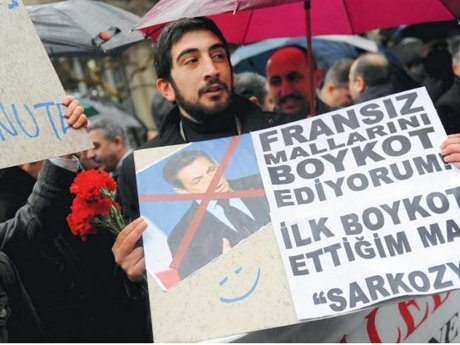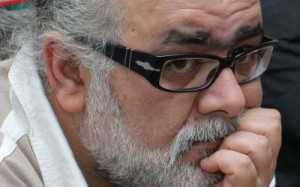By Nicolas Cheviron
Agence France Presse
ISTANBUL: Turkish hackers are threatening to unleash a wave of cyber attacks against French websites after legislators in Paris voted to approve a law that would ban the denial of the Armenian genocide.
Already, hackers have assailed dozens of French websites, including that of Valerie Boyer, the French politician who introduced the law that could punish genocide deniers with jail time.
Some attacks have been blamed on a hacking group known as AyYildiz, which says it fights for Turkish values.
“AyYildiz has nothing against the French,” he said. “But if this carries on, there will be far more serious attacks from many groups,” said Ishak Telli, a spokesman for the group.
The French lower house approved the law on December 22 and the Senate is expected to vote on it by the end of January.
If it is enacted, anyone denying that the 1915-1917 massacre of Armenians by Ottoman Turk forces amounted to genocide could face jail time.
Telli said hackers could initiate attacks causing millions of euros in damage.
“You can close commercial and banking sites,” Telli said. “You can take down government websites … The AyYildiz team has that capability.”
Ankara reacted angrily when the National Assembly passed the bill, quickly freezing political and military ties with France. Turkey withdrew its ambassador to Paris, but embassy officials say he will return Monday to monitor the Senate’s handling of the bill.
Starting in 1915, during World War I, many thousands of Armenians died in Ottoman Turkey. Armenia says 1.5 million were killed in a genocide where many perished after being forced to march into the desert without adequate supplies.
Turkey says around 500,000 died in fighting after Armenians sided with Russian invaders.
France recognised the killings as a genocide in 2001, but the new bill would punish anyone who denies this with a year in jail and a fine of 45,000 euros ($60,000).
Modern Turkey is still very sensitive about the issue, and has accused France of attacking freedom of expression and free historical enquiry.
Akincilar, another Turkish hacking group, was blamed on attacking Boyer’s site and that of French-Armenian politician Patrick Devedjian.
Such lawmakers would do better to “study Ottoman history,” the group said in a video sent to AFP.
“Our goal is to expose the arrogance shown by France when it legislates in its own parliament about the affairs of other countries,” the group said.
Web hacking is illegal in Turkey and hackers run the risk of prison.
But for those that do it, hijacking a website attacking Turkish beliefs and morals is not a crime, and no nationalist hacker has been targeted by authorities, said Ozgur Uckan, new media expert at the Istanbul Bilgi University.
“This type of hacking isn’t really punished,” Uckan said. “But if they attack Turkish government sites, the police will do everything in their power … It’s a kind of double standard.”
via THE DAILY STAR :: News :: Middle East :: Turkish hackers target French websites before genocide vote.






